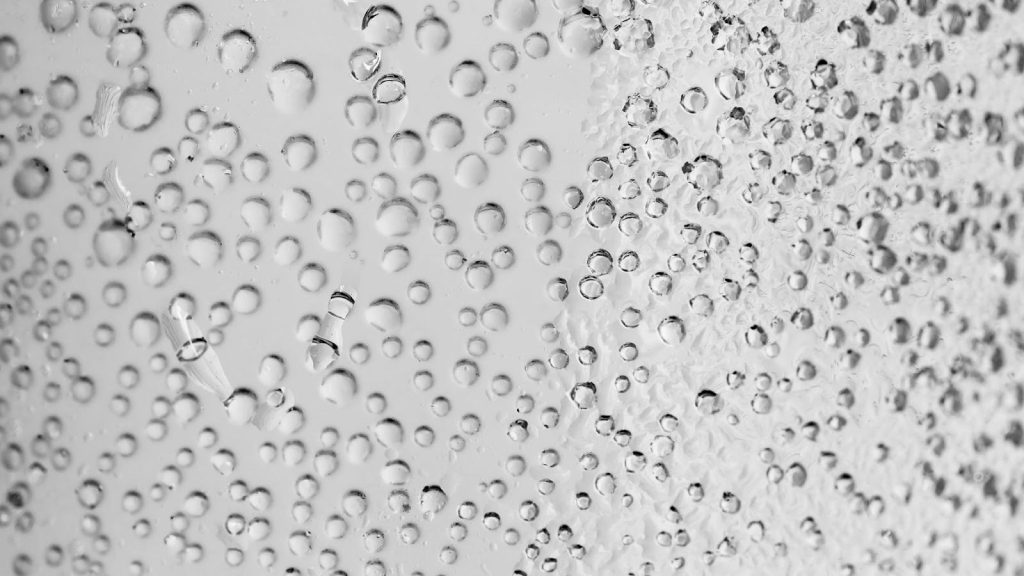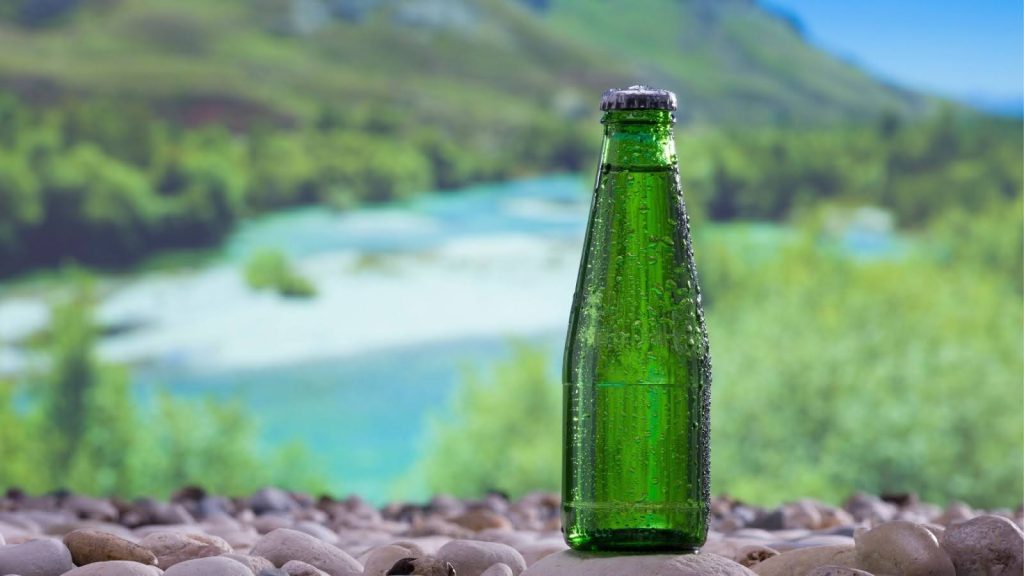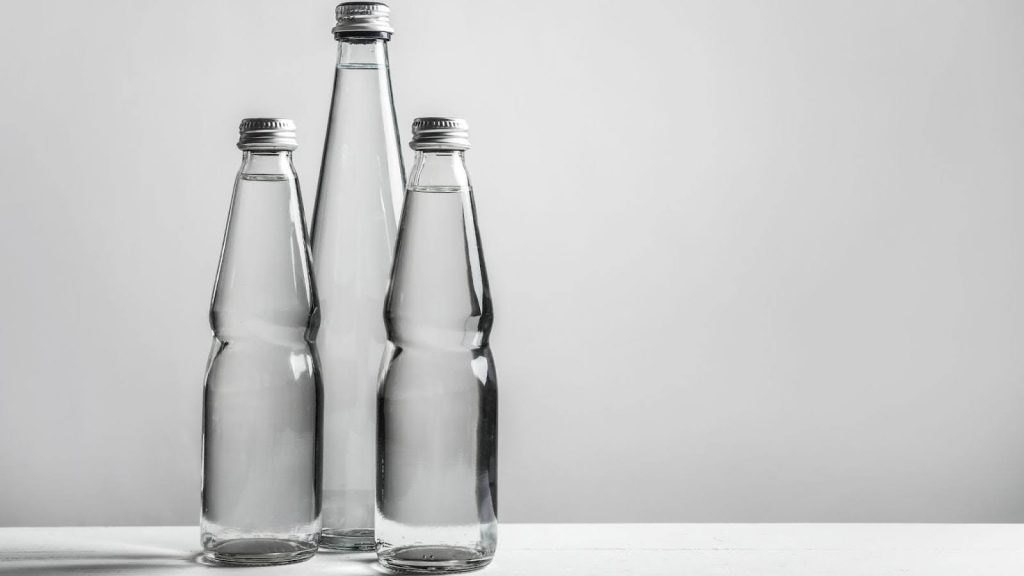
This article will delve into the unique characteristics, benefits, and potential health impacts of sparkling water and mineral water by examining their sources and composition. The increased accessibility and consumption of these waters as alternatives to plain water and sweetened soft drinks have made them a popular choice. We’ll dissect the various distinctions to help you understand what sets these two beverages apart.
Key Takeaways
- Sparkling water is carbonated water that can be artificially carbonated or naturally carbonated from springs, while mineral water comes from underground sources rich in essential minerals.
- Mineral water typically contains higher mineral content, which offers specific health benefits, whereas sparkling water is primarily valued for its carbonation and flavour enhancement.
What is Sparkling Water?
Renowned for its vivacious fizz, sparkling water, also known as bubbly water, has risen in popularity as a healthier alternative to both plain water and sweetened soft drinks. In essence, sparkling water is just regular water infused with carbon dioxide gas under pressure, which results in the pleasurable fizziness of bubbles that make this beverage so refreshing. Club soda, a type of carbonated water, is often chosen as a healthier alternative to regular soda due to its hydrating properties and lack of added sugars. We will explore more about the nature of sparkling water, including its different forms and typical added ingredients.
Types of Sparkling water
Numerous varieties of sparkling water exist, each distinguished by its distinct features. Seltzer water is a term that is interchangeable with sparkling water. Carbon dioxide is infused into plain water to create sparkling water, resulting in a beverage without additional minerals and typically utilised as a neutral-flavoured mixer for cocktails and various drinks. Alternatively, soda water is a type of carbonated water that is enhanced with added minerals like sodium bicarbonate and potassium sulphate that serve to improve its taste profile.
Sparkling water offers a healthier alternative to regular soda due to its hydrating properties and lack of added sugars, making it a beneficial choice for those focusing on weight loss and hydration.
Common additives in sparkling water
Sparkling water can sometimes have additional substances added to it to boost its flavour and make the drinking experience more enjoyable. Typical additives include sodium bicarbonate, sodium citrate, as well as artificial sweeteners which can influence both the taste and occasionally the nutritional content of the sparkling water.
What is Mineral Water?

Mineral water is valued for its inherent natural properties and has long been a popular choice among those looking for a healthy drink option. Sparkling mineral waters are rich in calcium and magnesium, which can improve bone health and provide essential minerals. In contrast to sparkling water, mineral water originates from subterranean springs and boasts an abundance of minerals that occur naturally. Mineral water acquires its carbonation naturally as a result of underground geological activities. This happens when groundwater comes into contact with and dissolves minerals from rocks, also incorporating gases such as carbon dioxide along the way, which lends the water its fizzy quality.
The process of percolating through geological strata endows the water with not only a unique set of health attributes but also a distinctive flavour profile. Variations in mineral concentration contribute to diverse tastes and corresponding health advantages.
Types of mineral water
Two main varieties of mineral water exist: still and sparkling. Still mineral water lacks carbonation, offering a flat, bubble-free experience for people who favour a tranquil and revitalising drink.
Conversely, natural carbonation infuses sparkling mineral water with a fizzy quality similar to that of other types of sparkling water. The bubbles in this beverage may originate naturally from geological sources or can sometimes be introduced through processed means.
3 Key Differences Between Sparkling and Mineral Water
Although sparkling water and mineral water are both appealing substitutes for plain water, they vary greatly in terms of their origin, manufacturing processes, and the amount of minerals they contain.

1. Source and production
Sourced from natural springs, mineral water acquires its dissolved minerals through contact with underground rocks. The carbonation of this type of water occurs naturally when it absorbs carbon dioxide present in the earth’s mantle. During this process, carbonic acid is formed, which contributes to the effervescence in sparkling water.
On the other hand, sparkling water usually originates from standard water to which carbon dioxide has been artificially introduced. This variance in how they are produced leads to a noticeable difference in both taste and the level of minerals found within each kind of carbonated water.
2. Mineral content
Compared to sparkling water, mineral water typically contains a greater amount of essential minerals such as calcium and magnesium. These contribute not only to the health benefits but also give mineral water its characteristic flavour.
In contrast, sparkling water is often appreciated more for its bubbly carbonation and invigorating taste rather than its minimal added mineral content. The variances in levels of minerals underscore the distinct health benefits associated with drinking mineral water over sparkling water.
3. Taste and health benefits
Mineral water’s flavour profile can be quite diverse due to the minerals it contains and is typically characterised as rich and smooth. These taste nuances not only make for a delightful drinking experience but also signal the health advantages that come from its mineral composition.
The fizzy quality of sparkling water creates a crisp and bubbly texture that is frequently paired with additional ingredients for flavour enhancement. While each kind of water provides essential hydration, their unique tastes along with their respective benefits could guide your selection according to individual taste preferences.
Mineral water boasts an abundance of vital minerals such as calcium, zinc, sodium and magnesium. Calcium is renowned for enhancing bone strength, while magnesium plays a critical role in muscle function and maintaining proper hydration levels.
Mineral water vs sparkling water, which one should I choose?
The choice between drinking sparkling water or mineral water comes down to personal preference, health considerations and how you plan to consume the drink. You may wish to choose mineral water if you want the added minerals and enjoy the unique taste that is associated with it. On the other hand, sparkling water may be a good choice if you prefer the fizzy sensation of a neutral-tasting, calorie-free alternative to soft drinks.
We hope this blog post has outlined the essential details between sparkling water and mineral water to provide you with a better understanding of the differences and benefits associated with both beverages.
Explore our range of wholesale water products to find the right choice for you.
Frequently Asked Questions
The primary distinction between mineral water and sparkling water is based on their origins and the method by which they become carbonated. Mineral water emanates from natural springs, imbued with minerals, while sparkling water undergoes an artificial infusion of carbonation.
Drinking sparkling water in moderation is advisable, as excessive consumption may cause enamel erosion due to its acidity. Maintaining a balanced intake can help mitigate this health risk.
Mineral water indeed offers health benefits, as it is rich in essential minerals such as calcium and magnesium, which support bone and muscle health. Consuming mineral water can contribute to your overall well-being.
People may drink sparkling water for several reasons, ranging from taste preferences to health benefits. Some enjoy the beverage as a healthier alternative to sweetened soft drinks or still water, whereas others wish to harness the neutral and fizzy properties of the drink to elevate a mixture such as a cocktail.
Whether being used as a healthy alternative to sugary drinks, or simply a preferred way to stay hydrated, sparkling water has become a popular choice for many people.
